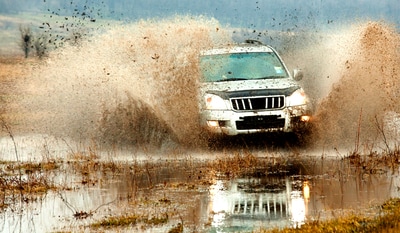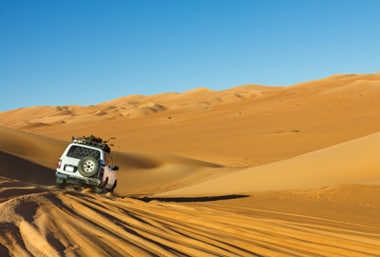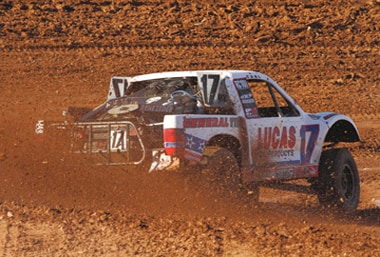What is Off Roading
Off-roading is a rugged, in-the-wilds activity that involves navigating vehicles on dirt tracks, mountain paths or desert trails. It is pursued on terrain such as sand, gravel, snow, mud, rock, grassland, riverbeds (dry or with shallow water), and other natural terrain – away from unpaved surfaces.
Variants of off-roading include dune-bashing (or ‘wadi’ bashing, as it’s called in the countries of the Gulf), cross country, rally raid, green laning, mudding, rock racing and competitive trials. There are also winch events, which necessitate the use of a winch (at the back and at the front of the vehicle) to access hard-to-reach places like ravines and precipitous inclines. Motocross – motorcycle racing done off-road – is performed on enclosed circuits.
Off-roading is done in all-terrain vehicles (ATVs), both four- and two-wheel, like 4x4’s, jeeps, snowmobiles, dirt bikes, quad bikes, rock crawlers and sand rails.
This is a sport that’s all burning rubber – and all action!
History of Off-Roading
A Frenchman by the name of Adolphe Kégresse is credited with the design of the world’s first off-road model. When in the employ of Czar Nicholas II of Russia, in the 1900s and 1910s, Kégresse designed a track in the style of a caterpillar, with a flexible belt, which could be modified to a regular motorcar or truck.
But off-roading as an adventure pursuit can trace its origins from the time when jeeps became a popular mode of transport among Americans, in the years following the end of the Second World War. These super-sturdy vehicles epitomize the often muscular thrills of no-holds-barred off-roading, and with the American military making accessible to civilians its many jeeps leftover from WW2, Americans took to off-roading as a recreational pastime with a passion.
A conventional jeep, incidentally, would have four-wheel drive, high-ground clearance and low gearing. Nowadays, there is a mind-boggling variety of off-road vehicles out there for those folks who love hitting the dirt, to choose from – both solidly heavy-duty and all-purpose light-duty.
Off-roading events are legendary, the Dakar Rally and the Baja 1000 being among the most famous. These events are a test of both navigational expertise and vehicle resilience. Motocross events, as arduous as any off-road activity, are popular in Britain.
Off-Roading in India
Though off-roading is pretty much a niche adventure sport amongst Indians – restricted mainly to those who can afford the machines – the country does boast of some fine terrain for the purpose. Parts of the Himalayas feature perfect – and often spectacular – off-roading terrain, while Ladakh’s high-altitude desert offers equally favourable conditions for the activity. Out west in Gujarat, the salt marshes of the Rann of Kutch make for a unique off-roading experience.
Equipment
Tow rope, shovel, two-way radio, GPS navigation + maps, full tank + extra fuel, spare tyre, portable air compressor (a high-lift jack might also be necessary), back-up water for radiator, fire extinguisher.
A daredevil attitude may also come in handy!
Best season in India
For a sport that places emphasis on endurance and strength, off-roading is best enjoyed in arduous conditions – the heat of the desert and the cold of the mountains make for challenging off-roading. But if you’re not an extreme-weather person, you can indulge in off-roading any time of the year.
Off-Roading sites in India
Rajasthan – Jodhpur, Nagaur, Bikaner, Jaisalmer, Barmer
Ladakh – Nubra Valley
Gujarat – Rann of Kutch
Tips
Prepare well (see equipment), and don’t ignore the safety aspects of off-roading. You might think you’re a can-do-no-wrong dude on wheels but come ready for any unforeseen (and unfortunate) eventuality. Off-roading is thrilling, and plenty of fun, but it’s not a sport for the faint-hearted!
Medical concerns
Off-roading is a demanding, and often dangerous activity. Besides food and water, make sure there are emergency rations and medical supplies near the venue/location, should any urgency arise (if not, carry some with you). Enjoy the thrill of the ride, but take all necessary precautions – and don’t forget to bring along a first-aid kit.
Ecological concerns
Off-roading, an activity that continues to grow in popularity, has come in for much censure from environmental groups. These groups contend that ATV use leads to soil erosion, destruction of terrain and local habitats (including harm to species) and pollution. It has also been noted that the two-stroke engines of (most) off-road vehicles have been known to cause excessive amounts of pollution, affecting air, soil and groundwater. It has, in addition, been proved that the high levels of noise from these machines have led to adverse behavioural changes in animals.
When indulging in off-roading, take steps to make sure that any negative effects on the environment are minimized. Ensure whether use of the off-road trail you are going to be travelling on is legal, and also, that the organizers of the event/race are committed to protecting the local ecosystem and helping out in conservation efforts. Above all, do endeavor to use public land responsibly, and try as much as possible to maintain the peace of the area.







 Share Via
Share Via











